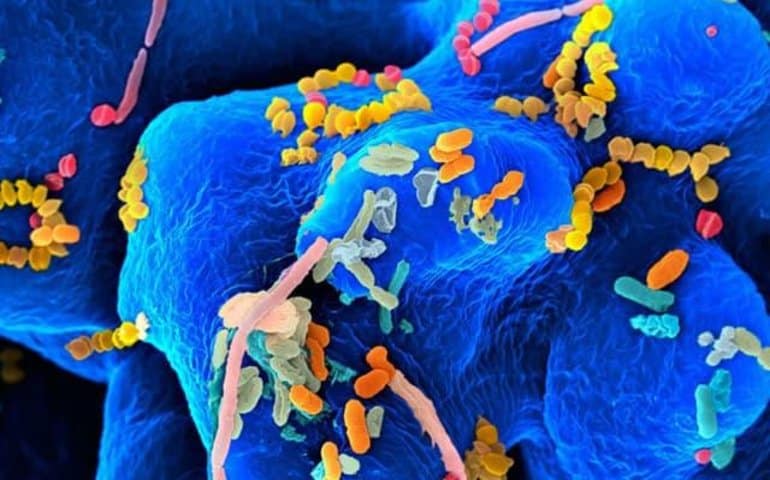Summary: Both wisdom and loneliness appear to be influenced by microbial diversity within the gut, a new study reports.
Source: UCSD
The evolving science of wisdom rests on the idea that wisdom’s defined traits correspond to distinct regions of the brain, and that greater wisdom translates into greater happiness and life satisfaction while being less wise results in opposite, negative consequences.
Scientists have found in multiple studies that persons deemed to be wiser are less prone to feel lonely while those who are lonelier also tend to be less wise. In a new study, published in the March 25, 2021 issue of the journal Frontiers in Psychiatry, researchers at University of California San Diego School of Medicine take the connection between wisdom, loneliness and biology further, reporting that wisdom and loneliness appear to influence — and/or be influenced by — microbial diversity of the gut.
The human gut microbiota is comprised of trillions of microbes — bacteria, viruses, fungi — that reside within the digestive tract. Researchers have known for a while about the “gut-brain axis,” which is a complex network that links intestinal function to the emotional and cognitive centers of the brain.
This two-way communication system is regulated by neural activity, hormones and the immune system; alterations can result in disruptions to stress response and behaviors, said the authors, from emotional arousal to higher-order cognitive abilities, such as decision-making.
Past studies have associated gut microbiota with mental health disorders including depression, bipolar disorder and schizophrenia, as well as personality and psychological traits regarded as key, biologically based components of wisdom. Recent research has connected the gut microbiome to social behavior, including findings that people with larger social networks tend to have more diverse gut microbiotas.
The new Frontiers in Psychiatry study involved 187 participants, ages 28 to 97, who completed validated self-report-based measures of loneliness, wisdom, compassion, social support and social engagement.
The gut microbiota was analyzed using fecal samples. Microbial gut diversity was measured in two ways: alpha-diversity, referring to the ecological richness of microbial species within each individual and beta-diversity, referring to the differences in the microbial community composition between individuals.
“We found that lower levels of loneliness and higher levels of wisdom, compassion, social support and engagement were associated with greater phylogenetic richness and diversity of the gut microbiome,” said first author Tanya T. Nguyen, PhD, assistant professor of psychiatry at UC San Diego School of Medicine.
The authors said that the mechanisms that may link loneliness, compassion and wisdom with gut microbial diversity are not known, but observed that reduced microbial diversity typically represents worse physical and mental health, and is associated with a variety of diseases, including obesity, inflammatory bowel disease and major depressive disorder.
A more diverse gut microbiota may be less susceptible to invasion by outside pathogens, which could contribute to and help promote better resilience and stability of the community.
“It is possible that loneliness may result in decreased stability of the gut microbiome and, consequently, reduced resistance and resilience to stress-related disruptions, leading to downstream physiological effects, such as systemic inflammation,” the authors wrote.
“Bacterial communities with low alpha-diversity may not manifest overt disease, but they may be less than optimal for preventing disease. Thus, lonely people may be more susceptible to developing different diseases.”

The relationship between loneliness and microbial diversity was particularly strong in older adults, suggesting that older adults may be especially vulnerable to health-related consequences of loneliness, which is consistent with prior research.
Conversely, the researchers said that social support, compassion and wisdom might confer protection against loneliness-related instability of the gut microbiome. Healthy, diverse gut microflora may buffer the negative effects of chronic stress or help shape social behaviors that promote either wisdom or loneliness. They noted that animal studies suggest that gut microbiota may influence social behaviors and interactions, though the hypothesis has not been tested in humans.
The complexity of the topic and study limitations, such as the absence of data about individuals’ social networks, diet and degree of objective social isolation versus subjective reports of loneliness, argue for larger, longer studies, wrote the authors.
“Loneliness may lead to changes in the gut microbiome or, reciprocally, alterations of the gut milieu may predispose an individual to become lonely,” said Dilip V. Jeste, MD, Distinguished Professor of Psychiatry and Neurosciences at UC San Diego School of Medicine and senior author of the paper. “We need to investigate much more thoroughly to better understand the phenomenon of the gut-brain axis.”
Co-authors include: Xinlian Zhang, Tsung-Chin Wu, Jinyuan Liu, Collin Le, Xin M. Tu and Rob Knight, all at UC San Diego.
About this neurobiology research news
Source: UCSD
Contact: Scott LaFee – UCSD
Image: The image is credited to UCSD
Original Research: Open access.
“Association of Loneliness and Wisdom With Gut Microbial Diversity and Composition: An Exploratory Study” by Tanya T. Nguyen et al. Frontiers in Psychiatry
Abstract
Association of Loneliness and Wisdom With Gut Microbial Diversity and Composition: An Exploratory Study
Loneliness and wisdom have opposite effects on health and well-being. Loneliness is a serious public health problem associated with increased morbidity and mortality. Wisdom is associated with better health and well-being. We have consistently found a strong negative correlation between loneliness and wisdom.
The present study aimed to investigate the association of loneliness and wisdom with the gut microbiome. One hundred eighty-four community-dwelling adults (28–97 years) completed validated self-report-based measures of loneliness, wisdom, compassion, social support, and social engagement. Fecal samples were collected and profiled using 16S rRNA sequencing.
Linear regression analyses, controlling for age and body mass index, revealed that lower levels of loneliness and higher levels of wisdom, compassion, social support, and social engagement were associated with greater phylogenetic richness and diversity of the gut microbiome. Partial least squares (PLS) analysis to investigate multivariate relationships extracted two composite variables.
Linear regression model predicting alpha-diversity with PLS components revealed that a linear combination of all psychosocial predictors (with negative loading for loneliness and positive loadings for all others, including wisdom, compassion, social support, and social engagement) was significantly associated with alpha-diversity. For beta-diversity, compassion and wisdom accounted for a significant proportion of variance in overall microbial community composition.
Findings may have implications for interventions to reduce loneliness and possibly its health-related adverse consequences.
Future research should explore whether increasing compassion and wisdom may improve loneliness and overall well-being as well as microbial diversity.







